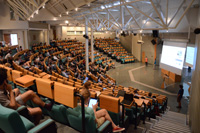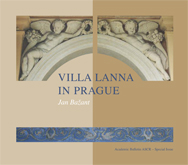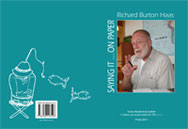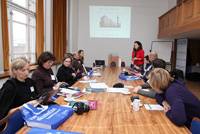Conference "Gender Mainstreaming in STEM and Global Change Sciences"
10 Sep 2015
![]() On the 14th and 15th October 2015 Global Change Research Centre will host an international conference called "Gender Mainstreaming in STEM and Global Change Sciences' (STEM – science, technology, engineering and mathematics). The conference, which is one of the events within a project of FP7 – EGERA, will feature international experts in the field of equal opportunities in science and research. More information here.
On the 14th and 15th October 2015 Global Change Research Centre will host an international conference called "Gender Mainstreaming in STEM and Global Change Sciences' (STEM – science, technology, engineering and mathematics). The conference, which is one of the events within a project of FP7 – EGERA, will feature international experts in the field of equal opportunities in science and research. More information here.
ATLAS and CMS experiments shed light on Higgs properties
1 Sep 2015
Three years after the announcement of the discovery of a new particle, the so-called Higgs boson, the ATLAS and CMS Collaborations present for the first time combined measurements of many of its properties, at the third annual Large Hadron Collider Physics Conference (LHCP 2015). By combining their analyses of the data collected in 2011 and 2012, ATLAS and CMS draw the sharpest picture yet of this novel boson. The new results provide in particular the best precision on its production and decay and on how it interacts with other particles. All of the measured properties are in agreement with the predictions of the Standard Model and will become the reference for new analyses in the coming months, enabling the search for new physics phenomena. This follows the best measurement of the mass of the Higgs boson, published in May 2015 after a combined analysis by the two collaborations.
For the first time ever: Protons accelerated in the plasma produced from hydrogen ice by a laser
27 Aug 2015
 High-energy protons find application in medicine for irradiation of tumors as well as in many other science and technology fields (such as proton radiography). Very efficient acceleration of protons occurs in the hot plasma produced by a high-power laser beam focused on a target containing hydrogen. The thicker the target and the more hydrogen in it, the more accelerated protons. The ideal would be to have a laser target of pure hydrogen frozen into a solid state at temperatures as low as -261°C.
High-energy protons find application in medicine for irradiation of tumors as well as in many other science and technology fields (such as proton radiography). Very efficient acceleration of protons occurs in the hot plasma produced by a high-power laser beam focused on a target containing hydrogen. The thicker the target and the more hydrogen in it, the more accelerated protons. The ideal would be to have a laser target of pure hydrogen frozen into a solid state at temperatures as low as -261°C.
Computation neuroscience meeting in Prague
26 Aug 2015
 From July 18 to 23, the Prague City welcomed the 2015 Annual Computational Neuroscience Meeting. One of the organizers was the Institute of Physiology CAS.
From July 18 to 23, the Prague City welcomed the 2015 Annual Computational Neuroscience Meeting. One of the organizers was the Institute of Physiology CAS.
The purpose of the Organization for Computational Neurosciences is to create a scientific and educational forum for students, scientists, other professionals and the general public to learn about, to share, to contribute to, and to advance the state of knowledge in computational neuroscience.
Call for TV programmes or New Media productions
19 Jun 2015
The organizers of the The 2015 Science TV and New Media Festival are pleased to announce the Call for TV programmes or New Media productions for the 2015 European Science TV and New Media Festival and Awards. There is a significant expansion of the agenda this year and a change of format, with the festival and awards now combined as a single three day event in Lisbon, Portugal, from 23 to 25 November 2015. The venue will be the celebrated Sao Jorge theatre in the centre of Lisbon. There will be ten awards decided in Lisbon, and two further awards relating to young people and education decided by specific audiences Europe-wide, all listed below. The screenings will be complemented by panel led discussions and keynote talks on themes relating to Science and the TV/AV media. This year there will also be discussions after each screening of the productions shortlisted by the international jury. The Awards will be presented in Lisbon in a special evening on the third day of the event at the Jorge Theatre in central Lisbon, on 25 November.The deadline for entries is the end of June 2015. All entries must include a filled-in entry form and (apart from interactive video) a DVD. More information on http://europaws.org/.
ERC celebrates 5,000th top researcher funded
17 Jun 2015
Eight years after its launch, the European Research Council (ERC) is celebrating a significant milestone: the funding of its 5,000th researcher. To mark this occasion, a debate in the European Parliament and a symbolic awarding of the grant took place June 16, 2015 in Brussels. The 5000th grantee, Dr Iva Tolić, is a leading Croatian cell biophysicist. An ERC Consolidator Grant will allow her to study the forces acting on the chromosomes during cell division. Her research could be critical for the development of new therapies against cancer. Dr Tolić will carry out her project at the Ruđer Bošković Institute in Zagreb. After receiving the news, she commented: "This ERC grant will make a big difference to me professionally. It will allow me to establish my new lab in Croatia, hire six team members and buy a state-of-the-art microscope. For the next five years, I will be able to focus purely on my research. I am very happy to be the 5000th ERC grantee."
SYRIA – From Crony Capitalism to War Economy
16 Jun 2015
 Oriental Institute of the Czech Academy of Sciences cordially invites you to a lecture on SYRIA – From Crony Capitalism to War Economy: The Economic Roots of the Current Crisis by Akram Kachee (Sciences Po, Lyon) on 23 June, 2015, 13:00–14:30 in Oriental Institute in Prague. Akram Kachee is an associate researcher in political science, GREMMO, France. His specialization is the Middle East and especially Syria, economy of war, and political opposition movements in Syria.
Oriental Institute of the Czech Academy of Sciences cordially invites you to a lecture on SYRIA – From Crony Capitalism to War Economy: The Economic Roots of the Current Crisis by Akram Kachee (Sciences Po, Lyon) on 23 June, 2015, 13:00–14:30 in Oriental Institute in Prague. Akram Kachee is an associate researcher in political science, GREMMO, France. His specialization is the Middle East and especially Syria, economy of war, and political opposition movements in Syria.
“The economic issues are crucial to our understanding of both the causes of the civil war in Syria and the functioning of the society since the conflict has begun. In order to get a better sense of the events in Syria, this presentation will show how the pre–2011 economic system forms a part of the genesis of the conflict while identifying actors and dynamics of the war economy.”
Non-university Institutions in Science and Humanities, 1890–2015
9 Jun 2015
As a part of the celebrations of the 125th anniversary of founding of the Czech Academy of Sciences and Arts Masaryk Institute and Archive of the CAS, in cooperation with the Centre for the History of Sciences and Humanities, Institute for Contemporary History CAS organized the international conference Non-University Institutions in Science and Humanities, 1890–2015, which took place in Prague on 28th–29th May 2015. The purpose of the conference was to summarize the development and significance of non-university institutions associated with the advancement of science and humanities in the Central and South Eastern Europe; not only in the Czech Republic, but also in other countries of this region.
In the first block – Establishment of the Czech Academy of Sciences and Arts and its Parallels Abroad – professor Halina Lichocka, Polish Academy of Sciences, talked about the participation of Czech scientists in the activities of the Academy of Sciences in Krakow. You find her presentation here.
The Czech members of the Cracow Academy of Arts and Sciences (1872-1918)
8 Jun 2015
 Lecture by professor Halina Lichocka, Polish Academy of Sciences, about the participation of Czech scientists in the activities of the Academy of Sciences in Krakow, presented on 28 May 2015 at the National Technical Museum in Prague.
Lecture by professor Halina Lichocka, Polish Academy of Sciences, about the participation of Czech scientists in the activities of the Academy of Sciences in Krakow, presented on 28 May 2015 at the National Technical Museum in Prague.
A hand-written rescript of His Imperial and Royal Apostolic Majesty Franz Joseph I sparked off the preparatory works aimed at establishing an Academy of Sciences in Cracow. The rescript, written down in Vienna on May 2, 1871, was addressed to the Minister of Education Josef Jireček. The Emperor`s letter read as follows: « …My wish is to establish an Academy of Arts and Sciences in Cracow. I order you to be so kind as to start negotiations with the Cracow Scientific Society […], negotiations that will lead to the transformation of the Society into such an academy. I am awaiting respective motions to decide on them ».
The new booklet by the Association of Moravian institutes of the Czech Academy of Sciences
5 Jun 2015
The Association of Moravian institutes of the Czech Academy of Sciences that consists of the CAS institutes based in Brno and Ostrava and institutes that have detached units in Brno, Ostrava and the South Moravian Region, has prepared the well-arranged and detailed booklet with the information about the all CAS institutions in the Moravian region. You can download it here.
The Association of Moravian institutes of CAS was created by the Treaty of directors of institutions involved in the CAS on April 15, 2013. However, its roots are deeper, dating back to the Association of CAS Institutes founded on November 21, 2002. The aim of the association consists in particular in presentation, promotion and popularization of nonuniversity type of science and training in the basics of scientific work. It also seeks to coordinate interdisciplinary projects in CAS institutions in the Moravian region, it contributes to mutual awareness, cooperation and assistance to member institutes in organizational matters, consulting their common challenges and problems and presenting proposals and demands to the academy-level and other authorities. It also represents the member institutions with the municipal authorities of Brno and Ostrava, the South Moravian and Silesian Region, universities and media in the region.


 Česky
Česky













